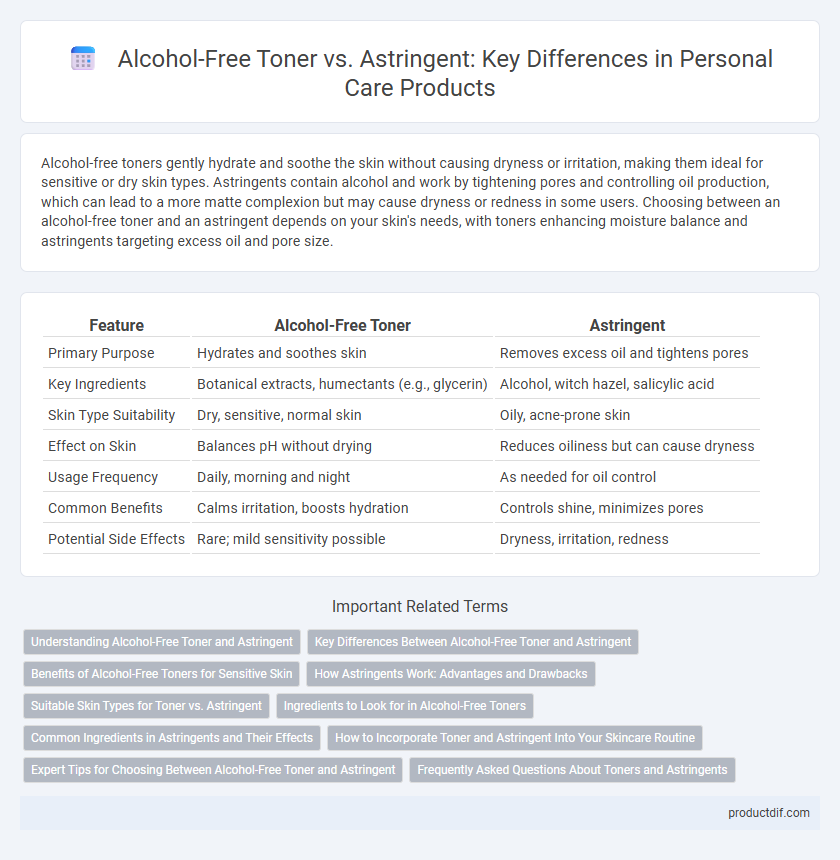Alcohol-free toners gently hydrate and soothe the skin without causing dryness or irritation, making them ideal for sensitive or dry skin types. Astringents contain alcohol and work by tightening pores and controlling oil production, which can lead to a more matte complexion but may cause dryness or redness in some users. Choosing between an alcohol-free toner and an astringent depends on your skin's needs, with toners enhancing moisture balance and astringents targeting excess oil and pore size.
Table of Comparison
| Feature | Alcohol-Free Toner | Astringent |
|---|---|---|
| Primary Purpose | Hydrates and soothes skin | Removes excess oil and tightens pores |
| Key Ingredients | Botanical extracts, humectants (e.g., glycerin) | Alcohol, witch hazel, salicylic acid |
| Skin Type Suitability | Dry, sensitive, normal skin | Oily, acne-prone skin |
| Effect on Skin | Balances pH without drying | Reduces oiliness but can cause dryness |
| Usage Frequency | Daily, morning and night | As needed for oil control |
| Common Benefits | Calms irritation, boosts hydration | Controls shine, minimizes pores |
| Potential Side Effects | Rare; mild sensitivity possible | Dryness, irritation, redness |
Understanding Alcohol-Free Toner and Astringent
Alcohol-free toners hydrate and soothe sensitive skin by removing impurities without stripping natural oils, making them ideal for dry or sensitive skin types. Astringents contain alcohol or other drying agents that tighten pores and reduce oiliness, often suited for oily or acne-prone skin. Understanding the differences helps in selecting the right product to maintain balanced skin health and prevent irritation.
Key Differences Between Alcohol-Free Toner and Astringent
Alcohol-free toners primarily focus on hydrating and soothing the skin without causing dryness, making them ideal for sensitive or dry skin types. Astringents contain higher concentrations of alcohol or other tightening agents designed to deeply cleanse pores and reduce oiliness, often leaving a drying effect. The key difference lies in their formulation and purpose: alcohol-free toners restore pH balance and provide moisture, while astringents act as potent pore cleansers with oil control properties.
Benefits of Alcohol-Free Toners for Sensitive Skin
Alcohol-free toners provide gentle hydration and soothing effects, making them ideal for sensitive skin prone to irritation. Unlike astringents, which often contain alcohol that can strip natural oils and cause dryness, alcohol-free toners maintain the skin's moisture balance and reduce redness. These toners support skin barrier repair and enhance overall skin comfort without the harsh effects associated with alcohol-based products.
How Astringents Work: Advantages and Drawbacks
Astringents work by constricting skin cells and tightening pores, which helps reduce oiliness and minimize the appearance of pores, making them effective for acne-prone and oily skin. Their advantages include deep cleansing and reducing inflammation, but drawbacks involve potential dryness and irritation, especially for sensitive or dry skin types. Choosing an alcohol-free toner with gentle astringent properties can balance cleansing benefits while maintaining hydration and skin barrier health.
Suitable Skin Types for Toner vs. Astringent
Alcohol-free toners are ideal for sensitive, dry, and combination skin types as they hydrate and soothe without stripping natural oils, while astringents suit oily and acne-prone skin by effectively reducing excess sebum and tightening pores. Toners often contain calming ingredients such as aloe vera and chamomile, making them gentle for daily use on delicate skin. In contrast, astringents usually include stronger agents like witch hazel or alcohol, targeting oil control and minimizing blemishes on more resilient skin types.
Ingredients to Look for in Alcohol-Free Toners
Alcohol-free toners typically contain soothing ingredients like aloe vera, chamomile, and witch hazel extract, known for their anti-inflammatory and hydrating properties. Look for antioxidants such as green tea and rose water, which help protect the skin from environmental stressors without causing dryness. Humectants like glycerin and hyaluronic acid are essential in alcohol-free toners to maintain moisture balance while gently cleansing.
Common Ingredients in Astringents and Their Effects
Astringents commonly contain alcohol, witch hazel, and salicylic acid, which work to tighten pores, reduce oiliness, and exfoliate dead skin cells. Alcohol-free toners often replace these with soothing ingredients like aloe vera, rose water, and glycerin to hydrate and calm the skin without causing dryness or irritation. Understanding these ingredient differences helps consumers choose products suited for sensitive or oily skin types.
How to Incorporate Toner and Astringent Into Your Skincare Routine
Incorporating alcohol-free toner into your skincare routine helps maintain hydration while balancing pH levels, ideal for sensitive or dry skin types. Use astringent after cleansing to tighten pores and reduce oiliness, especially beneficial for oily or acne-prone skin, but avoid overuse to prevent irritation. Apply toner with a cotton pad or hands, followed by targeted astringent application on problem areas, then seal in moisture with a suitable moisturizer.
Expert Tips for Choosing Between Alcohol-Free Toner and Astringent
Experts recommend selecting an alcohol-free toner for sensitive or dry skin types to maintain hydration while gently balancing pH levels. Astringents, containing alcohol, effectively reduce excess oil and tighten pores, making them ideal for oily or acne-prone skin. Prioritize ingredients like witch hazel or aloe vera in toners and look for salicylic acid or benzoyl peroxide in astringents for targeted skincare benefits.
Frequently Asked Questions About Toners and Astringents
Alcohol-free toners primarily focus on hydrating and soothing the skin, making them ideal for sensitive or dry skin types, while astringents contain alcohol or other ingredients that help tighten pores and control oil, suitable for oily or acne-prone skin. Common FAQs often address the difference between toners and astringents, their appropriate skin types, and how they complement cleansing routines. Consumers frequently inquire whether toners can replace moisturizers and how astringents impact skin pH balance and irritation risks.
Alcohol-Free Toner vs Astringent Infographic

 productdif.com
productdif.com